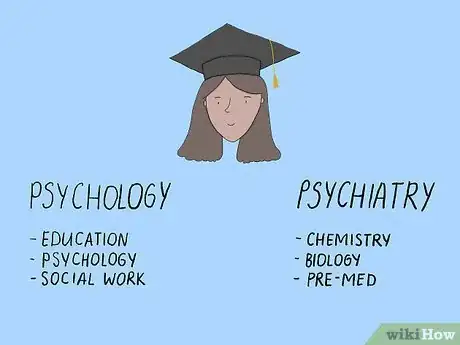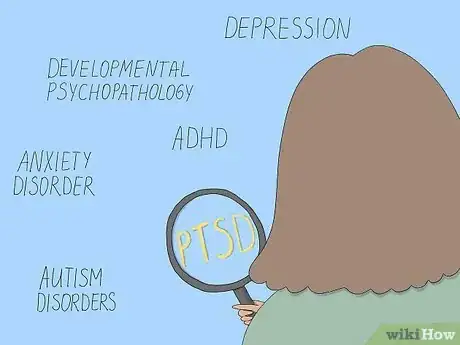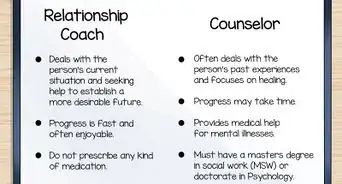This article was co-authored by Chloe Carmichael, PhD and by wikiHow staff writer, Eric McClure. Chloe Carmichael, PhD is a Licensed Clinical Psychologist who runs a private practice in New York City. With over a decade of psychological consulting experience, Dr. Chloe specializes in relationship issues, stress management, self esteem, and career coaching. She has also instructed undergraduate courses at Long Island University and has served as adjunct faculty at the City University of New York. Dr. Chloe completed her PhD in Clinical Psychology at Long Island University in Brooklyn, New York and her clinical training at Lenox Hill Hospital and Kings County Hospital. She is accredited by the American Psychological Association and is the author of “Nervous Energy: Harness the Power of Your Anxiety” and “Dr. Chloe's 10 Commandments of Dating.”
There are 18 references cited in this article, which can be found at the bottom of the page.
This article has been viewed 36,417 times.
Psychotherapists are trained professionals that treat emotional problems in patients. A psychotherapist could be a psychiatrist, psychologist, social worker, or counselor, depending on their level of education and accreditation.[1] You’ll need to determine whether you want to be a medical professional or standard counselor before pursuing a career in psychotherapy. Once you’ve chosen a career path, you’ll want to figure out where you want to practice and who your clients will be.
Steps
Choosing between Different Psychotherapy Careers
-
1Pursue psychiatry if you want the ability to prescribe medication. Psychiatrists are medical doctors, which means that you’ll need to go to a psychiatry program at a medical school after completing your bachelor’s degree. Psychiatrists are trained in both medical pharmacology as well as traditional forms of talk therapy and counseling. Pursue a career in psychiatry if you want to have the largest access to therapeutic resources.[2]
- You’ll need to pass the Medical College Admissions Test, or MCAT, in order to apply to medical school. Doing well on the MCAT is important because medical schools tend to be highly competitive and very selective. Make sure that you fully prepare yourself for the MCAT by studying well in advance of your test date.[3]
-
2Become a psychologist if you want to focus on talk therapy. Psychologists are non-medical doctors that specialize in mental health and human behavior. To become a psychologist, you’ll have to complete a PhD program after receiving your bachelor’s degree. Consider becoming a psychologist if you’re mainly interested in therapeutic practices that don’t require medication, like marriage counseling or individual therapy.[4]
- PhD is shorthand for Doctor of Philosophy. An individual with a PhD is still considered a doctor, they just can’t prescribe medicine.[5]
- PhD programs can be highly competitive and expensive, so don’t assume that the path to becoming a psychologist will be easier than the path to becoming a psychiatrist.
Advertisement -
3Train to become a counselor or social worker to focus on general needs. Social work and counseling are general terms for trained professionals that help people in need. Social workers and counselors often work with struggling families, children, or people dealing with addiction, and their patients often don’t suffer from mental illnesses. You typically have to become licensed as a social worker and counselor, and the requirements depend on the state or country that you live in.[6]
- Social workers and counselors often work for family welfare groups, government agencies, public clinics, or schools.
- Social workers and counselors usually specialize in a specific area of counseling, but this isn’t always necessary.
Becoming a Medical Psychotherapist
-
1Complete a bachelor’s degree in a major that’s relevant to psychotherapy. If you plan on becoming a psychologist, you may want to consider an undergraduate major in education, psychology, or both. You could also consider a degree in social work. If you’re interested in psychiatry, consider a science-based major that will help you in medical school. Chemistry, biology, or pre-med are all excellent choices.[7]
- Your grades will determine what kind of medical schools and PhD programs you can get into, so work hard as a college student to get the best grades you can!
-
2Pass the MCAT, GRE, or both depending on your desired program. Medical schools require the MCAT exam, while most PhD programs require the GRE (or Graduate Record Examination). Medical schools will sometimes require both tests, while PhD programs rarely do.[8] Once you’ve completed the necessary exams, you can use your scores and previous grades to complete applications to the programs of your choice.
-
3Apply to medical schools or PhD programs based on your goals. Research potential programs or medical schools carefully. Most programs or medical schools focus on a handful of particular specialized programs, so consider what you want to study before applying. To apply, send your required test scores to your school of choice along with their school-specific application.
- Applications for medical schools and PhD programs are always listed on a school’s website. Read their requirements thoroughly to understand what you need to do to be accepted.
-
4Finish your program by choosing a specialty or focus. In medical school, you’ll have to choose a specific area of your field to focus on. In a PhD program, you’ll have to complete a thesis (an extensive research project) that tackles a highly specialized topic in your field. You don’t need to choose your specialty right away, but it’s a good idea to make an informed decision early on in your post-undergraduate studies.[9]
- The autism spectrum, trauma, and developmental psychopathology are all common specialties. Choose a specialty that appeals to your areas of interest.
-
5Become a licensed medical therapist in your state or country. Having a degree does not make you a licensed psychologist or psychiatrist. You’ll have to register your medical licenses and degrees with the state or country that you plan to practice in. There is typically a fee associated with this process. Once you’ve received your license to practice, you can begin working in your field.[10]
- The specific requirements for your state can be found online, usually on the website of your state’s Board of Psychology.
- Most states require supervised professional experience, a licensing exam, and a distinct application form accompanied by transcripts.[11]
Pursuing Psychotherapy as a Counselor or Social Worker
-
1Complete a bachelor’s degree in psychology, social work, or counseling. Take your specific career goals into account when selecting a major. If you plan on becoming a drug counselor or child welfare specialist, social work may be a better major than psychology. If you want to focus on in-depth and long-term counseling, a degree in psychology may be better.
- You may want to consider minoring in sociology, political science, or a foreign language as well. These minors will pair well with you degree and will make you more marketable to potential employers.[12]
-
2Obtain a Master of Social Work (MSW) if you want or need additional accreditation. Many states and countries require social workers to complete a master’s degree in social work. While some schools may ask you to take the GRE, most of them won’t require an advanced test. In your master’s program, you will specialize in a specific field within your discipline, and you may be required to complete a thesis.[13]
-
3Apply for licensure or certification in the country or state where you live. Every state and country has different requirements for social worker accreditation. You will likely need to complete an application and pass a state-specific exam in order to earn your social worker’s license. There is usually a fee associated with these applications and tests.[14]
- You may have to pass the Association of Social Work Boards exam (or ASWB). This is a common test required by states in the United States to become a professional social worker.[15]
- Social worker licensing is state-specific. Requirements for each state are compiled online by Social Work Licensure, an organization of practicing social workers that track each state’s laws regarding certification.[16]
- Most states require a clinical exam, references, and a documentation of social work training and experience.[17]
Starting Your Career
-
1Apply for an entry level position in psychology or psychiatry to get experience. Psychologists and psychiatrists often start out as research assistants or psychiatric technicians. Research assistants generally don’t work directly with patients in a therapeutic setting and tend to focus on research and publication. Psychiatric technicians work as part of a team in a medical or mental health facility, such as a hospital, clinic, or rehabilitation center.[18]
- Be open to opportunities in fields that may not work directly with patients at first. It often takes some time to get experience behind the scenes before tackling clinical work.
- Bring a resume and samples of your psychotherapeutic research with you to your interviews. You’ll need to be prepared to talk about your research in detail, so bring work samples to share.
-
2Enter the field as a social worker or counselor based on your focus. Hospitals, schools, public clinics, and government agencies are all excellent places to start looking for work. Use your educational background as a starting point to find a job that matches your experience. If your studies focused on youth counseling, consider working for a nearby school or your local department of family services or child welfare. If your emphasis in school was on drug counseling, look for openings at rehabilitation centers or health clinics.[19]
- Due to the fact that social workers tend to require less schooling than psychiatrists or psychologists, feel free to apply to positions outside of your specific area of expertise. Many openings don’t require specific experience or schooling.[20]
- Research your organization carefully before showing up to an interview. A for-profit organization is going to ask different questions than a non-profit or government agency.
-
3Open a private practice if you have a business plan and can find clients. Starting a private practice involves opening a business, and can take years of financial maneuvering to get going. You’ll want to start by developing a business plan, finding an office, and registering your business. All of this can seem difficult and overwhelming, so make sure that it’s financially feasible by doing your research before taking the leap.[21]
- Psychologists and psychiatrists often rent out a smaller office in a larger building since they tend to require very little space to work.
- Social workers and counselors rarely open private practices, but you can always start a business that provides social work or counseling on a consultation basis.
EXPERT TIPChloe Carmichael, PhD is a Licensed Clinical Psychologist who runs a private practice in New York City. With over a decade of psychological consulting experience, Dr. Chloe specializes in relationship issues, stress management, self esteem, and career coaching. She has also instructed undergraduate courses at Long Island University and has served as adjunct faculty at the City University of New York. Dr. Chloe completed her PhD in Clinical Psychology at Long Island University in Brooklyn, New York and her clinical training at Lenox Hill Hospital and Kings County Hospital. She is accredited by the American Psychological Association and is the author of “Nervous Energy: Harness the Power of Your Anxiety” and “Dr. Chloe's 10 Commandments of Dating.”Licensed Clinical Psychologist
 Chloe Carmichael, PhD
Chloe Carmichael, PhD
Licensed Clinical PsychologistMake sure your practice supports the image of yourself as a professional, capable, and accessible therapist. Chloe Carmichael, Ph.D., a licensed clinical psychologist, suggests: "Ensure that the way your practice is presented reflects well on you as a therapist. This includes your business relations, advertising, media, and website. Also, take some time to craft your website with all of the information they'll need, put up a professional headshot, and try to get quoted in the media, which will increase your credibility.
-
4Build a client base by looking for referrals and advertising your services. Getting referrals from other doctors or professionals in adjacent fields of study are often a great way to build a client base. Let colleagues know what your services are, and tell them that you’re always open to consultations. Similarly, you can advertise your services online so that patients can learn more about what you do.[22]
- Consider making a professional website so that potential clients can learn about what you do and have the ability to contact you directly.
EXPERT TIPChloe Carmichael, PhD is a Licensed Clinical Psychologist who runs a private practice in New York City. With over a decade of psychological consulting experience, Dr. Chloe specializes in relationship issues, stress management, self esteem, and career coaching. She has also instructed undergraduate courses at Long Island University and has served as adjunct faculty at the City University of New York. Dr. Chloe completed her PhD in Clinical Psychology at Long Island University in Brooklyn, New York and her clinical training at Lenox Hill Hospital and Kings County Hospital. She is accredited by the American Psychological Association and is the author of “Nervous Energy: Harness the Power of Your Anxiety” and “Dr. Chloe's 10 Commandments of Dating.”Licensed Clinical Psychologist
 Chloe Carmichael, PhD
Chloe Carmichael, PhD
Licensed Clinical PsychologistTry to put yourself in your clients' shoes. When you're looking for clients, keep in mind that a lot of business skills are actually empathy skills. You want to think about how to make a person feel connected with your practice before they've ever had a session with you.
References
- ↑ https://www.bestcounselingdegrees.net/faq/what-is-the-difference-between-a-psychotherapist-and-a-clinical-psychologist/
- ↑ https://www.learnhowtobecome.org/psychiatrist/
- ↑ https://www.learnhowtobecome.org/psychiatrist/
- ↑ https://www.allpsychologyschools.com/clinical-psychology/how-to-become-a-psychologist/
- ↑ https://www.allpsychologyschools.com/clinical-psychology/how-to-become-a-psychologist/
- ↑ https://socialworklicensemap.com/become-a-social-worker/social-worker-careers/
- ↑ https://learn.org/articles/Majors_for_Aspiring_Psychiatrists_Your_Questions_Answered.html
- ↑ https://www.brown.edu/academics/college/advising/health-careers/standardized-tests-mcat-dat-gre
- ↑ http://med.stanford.edu/md/student-affairs/student-wellness/_jcr_content/main/panel_builder_2/panel_1/download_1095234323/file.res/Roadmap%20to%20Choosing%20a%20Medical%20Specialty%20.pdf
- ↑ https://www.apa.org/gradpsych/2004/01/get-licensed
- ↑ https://www.psychologist-license.com/states/kansas-psychologist-license.html
- ↑ https://www.socialworkdegreeguide.com/faq/what-is-a-good-minor-for-a-social-work-major/
- ↑ https://www.socialworkdegreeguide.com/faq/do-msw-programs-require-the-gre/
- ↑ https://www.mswguide.org/licensure/
- ↑ https://www.mswguide.org/licensure/
- ↑ https://socialworklicensure.org/about/
- ↑ https://socialworklicensure.org/state/social-work-licensure-massachusetts/
- ↑ https://www.online-psychology-degrees.org/faq/what-are-some-of-the-best-entry-level-psychology-jobs/
- ↑ https://www.socialworkguide.org/careers/
- ↑ https://www.socialworkguide.org/careers/
- ↑ https://www.apa.org/gradpsych/2011/11/private-practice
- ↑ https://practiceoftherapy.com/8-ways-to-get-clients/









































































